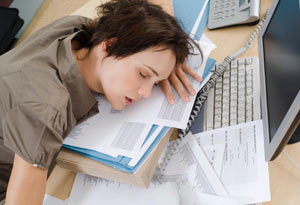Waking Up Is Hard to Do

Photo: Thinkstock
Tired of being tired in the morning? Sleep experts offer tips to awaken your inner rooster.
Binnie Wikane, a driver's license examiner's assistant in Allentown, Pennsylvania, loves almost every minute of her life. But there are moments that Binnie definitely doesn't enjoy; specifically, the very first ones of the day. "On one level, when that alarm goes off, I'm happy to see the day," she says. "But on a deeper level, my mind and body don't agree. I have to fight with everything I've got to get out of bed."Like many women, Wikane is a victim of sleep inertia, a sluggish state that makes getting out of bed one of the hardest things she does. "When we wake up, we all go through a certain amount of sleep inertia," says Deborah Sewitch, PhD, clinical director of the Center for Sleep and Ventilatory Disorders at the University of Illinois at Chicago. "For some, it can take ages to get it together; an hour later, they're still feeling groggy and not really 'there.'" Not surprisingly, the most common reason that women struggle through this morning transition is that they're not sleeping long enough or well enough. But if you're getting enough rest, eating well, and still dragging when the alarm goes off, you could make some changes to your routine that might help you break through the morning fog.
Easy Does It
There is a biological basis for hating the sudden blare of your alarm clock. "Sleep inertia can feel worse when you're awakened abruptly," explains Hans Van Dongen, PhD, a research assistant professor in the University of Pennsylvania's Division of Sleep and Chronobiology. "It forces you suddenly into a mode that your body isn't prepared for." A gentler alarm tone may be more effective at combating that can't-get-out-of-bed feeling. "A clock that allows you to wake up gradually may ease those first few moments of sleep inertia, which are the worst," says Van Dongen. Experiment with a different tone, such as Serenity's Zen alarm clock, featuring chimes that gradually increase in volume, or HoMedics Natural Sounds Spa clock radio, with options including ocean waves, a babbling brook, and more.
Preprogram Your Coffeepot
Sleep inertia decreases both physical and mental ability. In one small study, researchers found that subjects suffered motor skill deficits that lasted more than an hour after waking. But according to Mark Rosekind, PhD, president of Alertness Solutions, a company that offers stay-awake strategies to businesses, you can substantially decrease that downtime by drinking coffee. "The amount of caffeine in a strong cup of coffee can boost both physical performance and mental alertness by up to 30 percent within 15 to 30 minutes," he says. "If you're sluggish for an hour, getting that caffeine within the first five minutes of getting out of bed may gain you a half hour's head start on your morning." Look for programmable coffeemakers from Krups, Braun, Cuisinart, or Black & Decker that you can set to brew while you're still asleep. Just go easy: More than three or four servings of coffee, cola, or other caffeinated drinks can disrupt your next night's sleep.
Get a Little Physical
"Physical activity is one of the best ways we know to shake off grogginess, get alert quickly, and stay that way," says Rosekind. Instead of watching the morning news, walk to get the paper, take out the trash, or place a loud alarm clock (in addition to the one in your bedroom) in a different location in your house. "By the time you get to it, you'll have moved around a little," says Rosekind. "It may not be a lot of movement, but it'll be sufficient to kick your body into wake mode faster."
How to reset your internal clock



